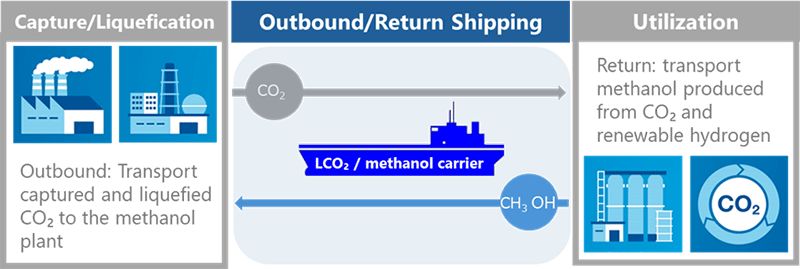Japanese shipping major Mitsui O.S.K. Lines (MOL) and compatriot Mitsubishi Shipbuilding, a part of Mitsubishi Heavy Industries (MHI), have secured approval in principle (AiP) for their jointly developed liquefied CO2 (LCO2)/methanol carrier.
Japanese shipping major Mitsui O.S.K. Lines (MOL) and compatriot Mitsubishi Shipbuilding, a part of Mitsubishi Heavy Industries (MHI), have secured approval in principle (AiP) for their jointly developed liquefied CO2 (LCO2)/methanol carrier.

Said to be the “world’s first”, the AiP was awarded by ClassNK for the vessel concept based on a low-pressure LCO2 carrier which aims to transport CO2 on outward voyages and synthetic methanol on return voyages.
By achieving dual transport of CO2 and methanol, MOL and Mitsubishi anticipate eliminating empty-cargo trips and improving overall transport efficiency.
With approval in place, MOL and Mitsubishi Shipbuilding intend to move forward with the development of the LCO2/methanol carrier, building on the findings and technical challenges identified during the concept study. The goal is to achieve commercialization of the vessel through collaboration with relevant companies in the supply chain and other partners
As MOL is working to build supply chains for synthetic fuel/methanol and CO2 through initiatives such as its investment in HIF Global, a U.S.-based developer of synthetic fuel/methanol, the LCO2/methanol carrier is expected to enhance the overall economic viability of these supply chains and contribute significantly to their realization.
Related Article
-
Major investment aims to drive progress with decarbonization via synthetic fuels production
Business Developments & Projects
Meanwhile, MHI is currently pursuing strategic measures to strengthen its business in the energy transition, and its unit, Mitsubishi Shipbuilding, seeks to contribute to the advancement of the maritime industries in Japan and around the world by utilizing its shipbuilding-based marine engineering technologies in addition to conventional shipbuilding, with the development of LCO2/methanol carrier as one example of these efforts.
Collaboration with MOL is also described as MHI’s commitment to partnerships that will incorporate external expertise and actively advance the development of a CCUS value chain.
Related Article
Content Original Link:
" target="_blank">








































































